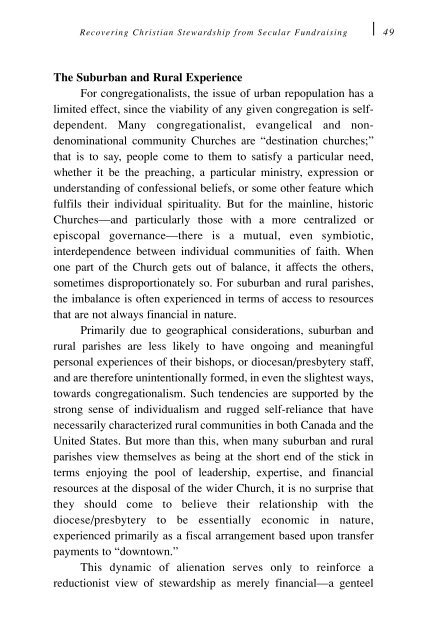Passionate Steward - 10th Anniversary Edition
10th Anniversary Edition of The Passionate Steward - Recovering Christian Stewardship from Secular Fundraising (St. Brigid Press - 2002).
10th Anniversary Edition of The Passionate Steward - Recovering Christian Stewardship from Secular Fundraising (St. Brigid Press - 2002).
You also want an ePaper? Increase the reach of your titles
YUMPU automatically turns print PDFs into web optimized ePapers that Google loves.
Recovering Christian <strong>Steward</strong>ship from Secular Fundraising 49<br />
The Suburban and Rural Experience<br />
For congregationalists, the issue of urban repopulation has a<br />
limited effect, since the viability of any given congregation is selfdependent.<br />
Many congregationalist, evangelical and nondenominational<br />
community Churches are “destination churches;”<br />
that is to say, people come to them to satisfy a particular need,<br />
whether it be the preaching, a particular ministry, expression or<br />
understanding of confessional beliefs, or some other feature which<br />
fulfils their individual spirituality. But for the mainline, historic<br />
Churches—and particularly those with a more centralized or<br />
episcopal governance—there is a mutual, even symbiotic,<br />
interdependence between individual communities of faith. When<br />
one part of the Church gets out of balance, it affects the others,<br />
sometimes disproportionately so. For suburban and rural parishes,<br />
the imbalance is often experienced in terms of access to resources<br />
that are not always financial in nature.<br />
Primarily due to geographical considerations, suburban and<br />
rural parishes are less likely to have ongoing and meaningful<br />
personal experiences of their bishops, or diocesan/presbytery staff,<br />
and are therefore unintentionally formed, in even the slightest ways,<br />
towards congregationalism. Such tendencies are supported by the<br />
strong sense of individualism and rugged self-reliance that have<br />
necessarily characterized rural communities in both Canada and the<br />
United States. But more than this, when many suburban and rural<br />
parishes view themselves as being at the short end of the stick in<br />
terms enjoying the pool of leadership, expertise, and financial<br />
resources at the disposal of the wider Church, it is no surprise that<br />
they should come to believe their relationship with the<br />
diocese/presbytery to be essentially economic in nature,<br />
experienced primarily as a fiscal arrangement based upon transfer<br />
payments to “downtown.”<br />
This dynamic of alienation serves only to reinforce a<br />
reductionist view of stewardship as merely financial—a genteel




